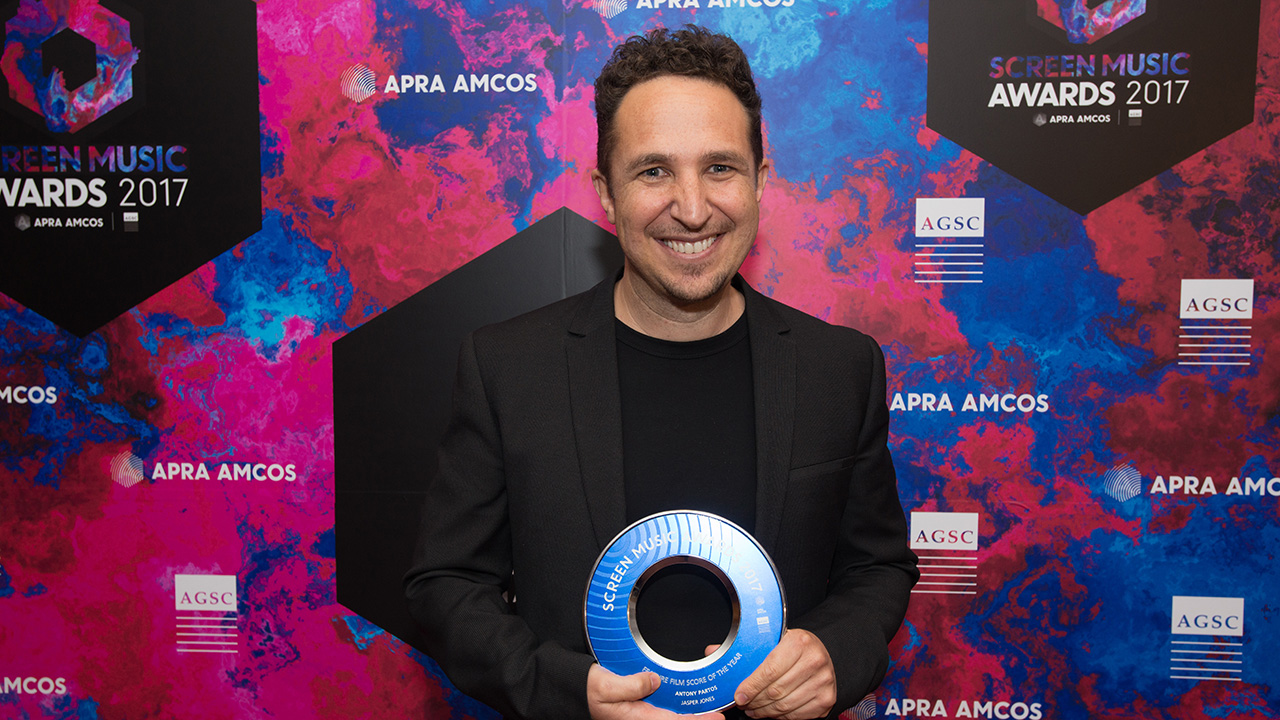AGSC president Antony Partos on a challenging year for screen composers

When Australia’s most awarded screen composer Antony Partos took over as president of the Australian Guild of Screen Composers (AGSC) in March this year, he had great expectations.
Among them was another buoyant year for screen music from Australian and overseas productions. Additionally, the Screen Music Awards, delivered annually by AGSC and APRA AMCOS, would be its usual lively social interaction.
However the shutdown of Australian productions meant spend on drama alone declined by 18% to $991 million, according to the Screen Australia Drama Report, with 74 Australian productions accounting for $543 million or 55% of total expenditure.
Australia’s low rate of coronavirus has meant more foreign productions with big-name actors want to shoot here – but that doesn’t mean much flow-through to local composers.
“With the exception of some LA productions which used local orchestras, a lot of overseas productions mean diddly-squat for the creative or post-production industries,” points out Sydney-based Partos.
For the first time, the 2020 Screen Music Awards will take to the screen itself, streamed on YouTube Premiere from 7pm AEDT on Tuesday December 1. Partos’ presidential address is expected to be more a call to arms.
“We’ve been pushing for more Australian stories, quotas for streaming services and whole raft of features to encourage film production,” he says.
“The government called for our input, and there was a unified front in our recommendations. It was rather disappointing to see the government didn’t listen to the recommendations, with the exception of the 20% rebate for TV productions.”
In 2020, Partos goes into the awards with a leading four nominations. One is for Best Music For A Documentary for the moving Maralinga Tjarutja, which focuses on the South Australian nation where atomic tests were trialled in the 1950s.
The second is for Best Original Song Composed For The Screen for ‘Edge Of Something’ from ABC TV political drama series Total Control, co-written with Missy Higgins and his long time screen collaborator Matteo Zingales.
There are two nominations for ABC comedy-drama series Operation Buffalo, for Best Television Theme and Best Music for a Mini-Series or Telemovie.
Partos says he did no research before starting work on Maralinga Tjarutja.
“I approach music from an emotional standpoint rather than specifically a cultural one,” Partos says.
“As a white composer, I approach works at not being tokenistic. Certainly working with Indigenous filmmakers, it’s also in their brief that they don’t want me to allude to an Aboriginal sound but to tell a story. So that’s always my starting point.
“I was familiar with the history of Maralinga, but apart from that, I didn’t need to research the musical landscapes. Otherwise it would have been tokenistic.”
The effect he went for on the admired opening theme was “an unstoppable force, it’s building momentum, trying to propel the audience to this momentous event but in quite an unstated and gentle way”.
“Not bombastic but highly emotional in its makeup. That hopefully builds the profound tragedy of the theme.”
Working with Missy Higgins on Total Control, did she bring a different approach, but would he like to work with ‘traditional rock composers’ in the future?
“I love the prospect of collaboration, but it has to be with the right people because collaborating is a fine balance,” he explains.
“With Missy, it worked so well because she’s a great lyricist. Secondly, despite her talents, she’s a very humble person and she was more than happy to do rewrites and take creative criticism on board and come back with something completely different depending on our feedback.”
While he relished the collaboration with Higgins, the composer can’t say it would be the same with all rock artists.
“When you’re collaborating with someone without a history of writing film music, you have to choose those people not too far out of their comfort zone,” Partos says.
“For the score for The Boys, which is many years ago, they used The Necks. They got The Necks to compose a whole bunch of music prior to the film and edited the music in. Because they got The Necks doing what The Necks do best, it was an excellent result.
“It was the same with Total Control: we were getting Missy to collaborate in songwriting with us, as opposed to getting her to write underscore with us. It made the score all the richer for having that collaboration, because she was performing to her strengths. It was a lot of fun.”
Rock bands might put up posters and album covers by their music heroes to inspire them in the studio. For Partos, the stimulation comes from a room full of exotic world music instruments, with different scales and tunings, and which build pieces quite quickly in a more natural sense. Creating a soundtrack is akin to unveiling a crossword puzzle.
“There is a roadmap set for you, much like clues in a crossword puzzle which you jump off,” he says.
“The clues have to coexist nicely to each other. The tempo has to be different or else it becomes boring. You have to find the right pace of the edit for that scene and you’re responding to the dialogue or the furtive looks of the characters. These are the clues you feed off.”






























